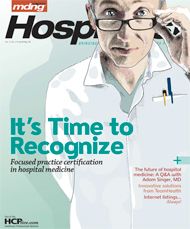PHRs face many challenges
Are MDNG: Hospitalist readers as excited as I am by Google’s foray into personalized health records (PHRs)?
Are MDNG: Hospitalist readers as excited as I am by Google’s foray into personalized health records (PHRs)? We are all familiar with patients who present to our hospital emergency department with acute medical issues but are unable to tell the ED staff anything useful about their medical history and current medications. In fact, one (or more) of these patients is likely sitting in your emergency department right now. Some patients carry this information written on a piece of paper, but it inevitably is out of date or illegible. In these cases, I usually end up having to contact the patient’s doctor, family, and pharmacy to track down this vital information. Even then, I am able to retrieve useful information only about half of the time. I’ve often wondered how much time and money I waste because I don’t have timely access to this information. Unfortunately, I do not have the time to calculate this, which is why the promise of PHRs excites me.
Many people store their photographs, financial records, and other important data online, so the notion of people also keeping their medical records online seems plausible. Can you imagine how much easier it would be if patients in the emergency department could hand you a piece of paper with their Google Health account passwords? You could hop onto the closest computer and retrieve a copy of their medical history and medication list without having to spend precious time on the phone.
I don’t know what the national statistics are, but I have encountered very few patients who keep their medical data online. One big obstacle to wider use is the difficulty of populating PHRs with useful and relevant information. Because the process is so much more complex than uploading photos for online storage, I find it difficult to imagine patients reliably populating accurate information into their PHRs.
Google Health interfaces with healthcare systems and payers and pulls the data into individual accounts. This approach seems to make sense, but it is far from perfect. The hospital where I work, Beth Israel Deaconess Medical Center in Boston, MA, set up an interface between its electronic medical records and Google Health. The interface was created and publicized with much fanfare in May 2008. But reports have surfaced that patients are finding inaccurate information in their Google Health accounts. As it turns out, Google Health also draws information from billing records, which sometimes contain imprecise information derived from the coding data that is required by payers. So, for example, some patients have found information in their records about metastatic cancer when they did not have this condition. Is this troubling? Yes, absolutely. Is this reason to stop using PHRs? No, absolutely not. As with any new technology, we must continue to improve the system. Patients and doctors must review the information being populated to ensure its accuracy. I still believe the technology holds great promise, but it does require some additional work before it can deliver on its intended goals.
Joseph Ming Wah Li, MD
